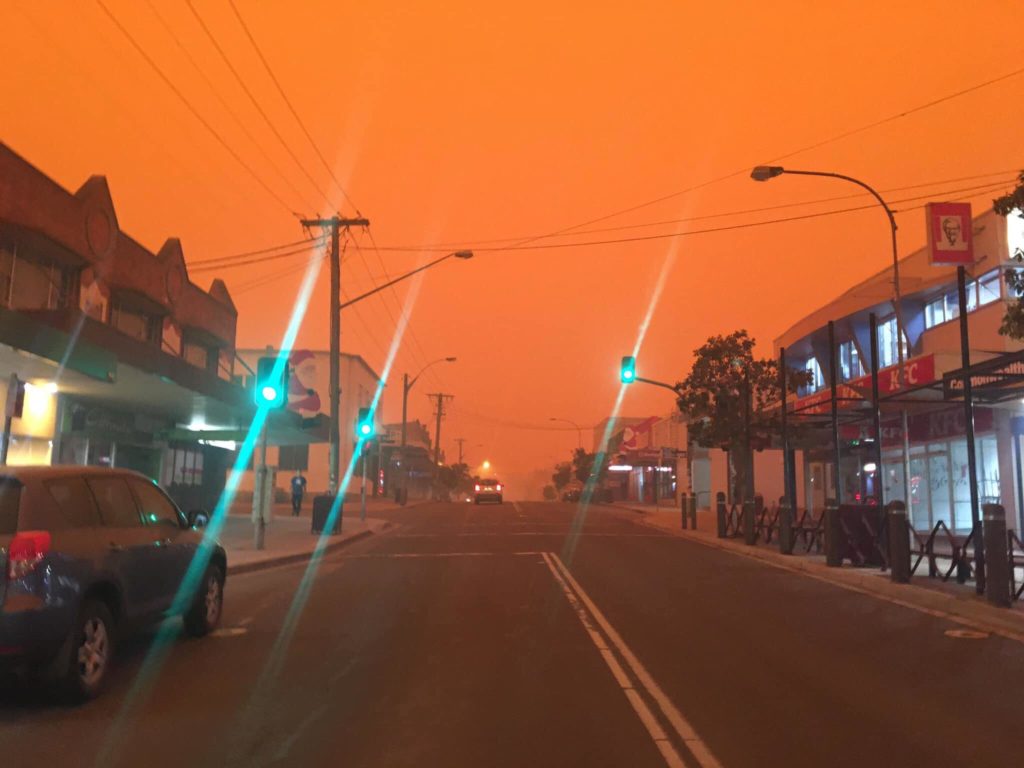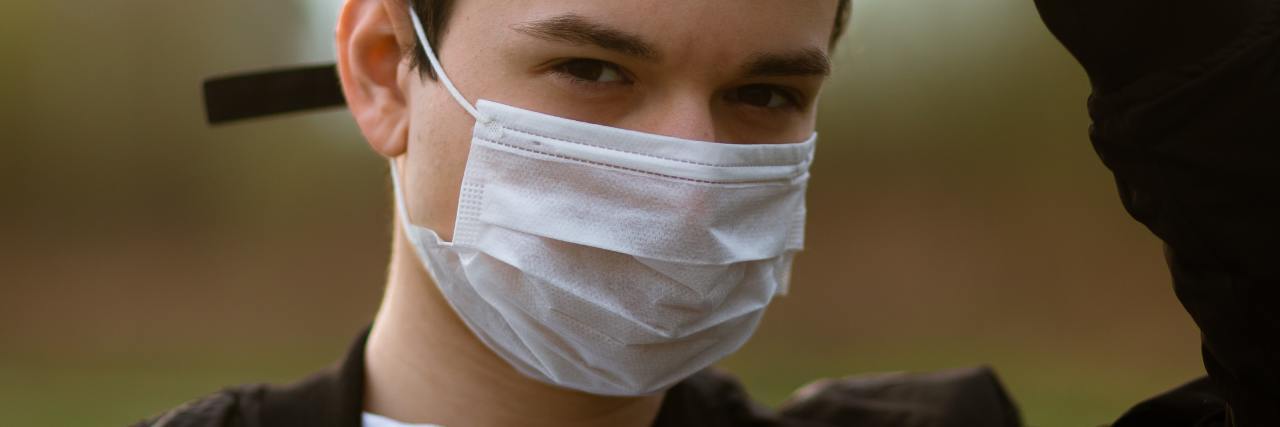How My Borderline Personality Disorder Prepared Me for the COVID-19 Pandemic
Editor's Note
If you’re struggling with self-judgment, check out The Mighty’s No Shame group. It’s a safe space to share how you’re feeling with other people who get it.
I confess I really didn’t want to write this article, so if you elect to not read I will understand. I also confess I have hardly read the coronavirus (COVID-19) articles on the Mighty; just a few titles and a few paragraphs. I haven’t read them not because I find them unworthy, but as a way to cope and survive. All I have read have been a few general articles in my local news outlets telling me the basic numbers, and the cans and cannots in what I can/can’t do, where I can/can’t go and who I can/can’t see. For the global ones where the infection and mortality rate are much higher than Australia, I try not to read beyond occasionally peering at the global tally. And I really try to stay away from the press conferences of world leaders, you know which ones, or of my own Prime Minister. But I know enough to know the virus is catastrophic, unprecedented and that many, many have died.
Using Our Mental Illnesses and the Therapy We’ve Done
The reason I’m writing is not to amplify the pandemic or resulting isolation, but rather to share that I feel my mental illness, which has plagued me more than half my life, has in many ways prepared me for such a traumatic new world order. Furthermore, the therapy I’ve done the last 20 years have given me the skills to cope and fight on, so I have decided to share my own experience. Before I do that, I acknowledge the many whose mental illness makes this experience so much worse. To all, I would like to share a few skills and perspectives that are helping me through this “brave new world” (in Aldous Huxley’s sense, not William Shakespeare’s “The Tempest”), and hope they can help you too.
The first point is that for people with mental illnesses, many of our so-called maladaptive world views or cognitive distortions present are actually no longer distortions but accurate. The feeling that the world is a malevolent place and that things don’t necessarily end well or happen for a discernible reason is something I’ve felt for a long time; see point four of my previous article.
This doesn’t mean ultimately surrendering to pessimism; it is rather a strong sense of how bad the world can be and that the forces for harm are ever-present. Furthermore, the life and death sense I carry around with me where my beliefs, feelings and relationships seem of the highest and heaviest importance much of the time now fits for the pandemic we are facing. The pervasive feeling that everything is life or death no longer feels out of proportion with the facts and when global disaster came my worldview wasn’t really disturbed. In fact, we got an earlier taste of this in Australia with the apocalyptic-like bushfires that kept spreading and spreading in extreme heat and on parched land at the start of the year, which you can see in the photo below, taken by my friend’s aunt in the coastal town of Bega in South Eastern Australia in the first week of January.

This was closely followed by the COVID-19 outbreak. I was almost in denial about it for a few months as a coping mechanism, but once the cases started to hit my country and my city, I had to accept. This acceptance was much easier after working so hard on radical acceptance when I did dialectical behavior therapy (DBT) a few years ago. For me, this DBT skill is probably the hardest, most confronting one to implement because it goes to the center of the wound but also because it can be easily misinterpreted as condoning past abuse and suffering. In short, this skill is a turning of your mind with a willingness to accept life as it is not how you wish it was relinquishing “the illusion of control.” As the founder of dialectical behavior therapy, Marsha Linehan, argues: “acceptance is the only way out of hell.” Accepting this new world order is not easy at all but having done the very tough groundwork in DBT, I have been more able to reduce additional suffering by not fighting against our new normal.
My Friend Is My Role Model During COVID-19
I have a new friend, whom I met in hospital last year, who better elucidates how mental illness can make us more equipped to cope in this COVID-19 world. She has obsessive-compulsive disorder (OCD) and, as she puts it she, was “ thrown into the mental health hospital” for the hygiene-related precautions used against COVID-19. She said, “now, if the public don’t follow these practices, they will be thrown into jail.”
For my friend, she feels she has finally been validated: “I feel like the whole world started understanding me and I am not the alien on this earth anymore. Now the whole world is practicing [these habits] … I suddenly feel I am ‘normal’ again when I use a barrier to open the door and standing like a robot without touching tram poles. No more shame from deep down in my heart as I could openly demonstrate OCD rituals and ironically I feel I am leading the world trend by the way I am handling daily things.”
As my wise friend eloquently explained, she believes it is people like her with OCD and also people with obsessive compulsive personality disorder (OCPD) who can show the world how it’s done: how to stay safe and alive. So even though these are disorders, as mine is, it seems we are more the ordered ones in such a pandemic. Namely, where our thoughts, feelings and behaviors are classified outside the realm of normal functioning by interfering in our daily function they could now be reclassified as justified thoughts, feelings and behaviors. We have learned to survive in crises and now we can impart that life and survival experience to our fellow humans facing this global threat. As I wrote in a previous article, our mental illness can be our superpower. And it could just be the best people to save us in this time, or to show us how it is done, are people with OCD or OCPD such as my friend.
Mindfulness
Another therapy skill that can help survive and stay calm in isolation is mindfulness. I admit, I don’t complete a mindfulness meditation every day, and am not always mindful. But mindfulness is often the best way to bring us into the present moment of our present environment as we observe, describe and then participate in what we see, hear, feel, smell and taste around us. This is a way to calm our anxieties, to challenge our darkest thoughts and feelings by focusing on what is directly in front of us, even if it is just our backyard. The “how” of how mindfulness is practiced is crucial here — that we observe, describe and participate in our physical surroundings with one mind without distraction without judgment and therefore effectively. Personally I like to sit in my backyard and watch the autumnal leaves fall from our large field elms while focusing on my breath, or do the 5-4-3-2-1 grounding exercise. Another activity I like to do mindfully outside is sweeping the many leaves that fall daily on our footpaths and deck. It is an endless task but not thankless because I get my body moving and do it with one focus, without judgment which leaves me with a sense of achievement, or effectiveness, every time.
The last activity that can be done mindfully at the moment is the activity that could most save our lives: washing our hands. I had enjoyed washing my hands before now for the cleansing feeling and for the almost-Biblical metaphor of washing away the daily impurities, but I mostly used to do it mindlessly. Now, we must do it so carefully for greater duration and frequency, and with more soap. The pure sensation of the soap and water on your hands is not just a metaphorical purification anymore but it is actually washing away any germs that could make us severely sick or take our lives. Never has the mindful practice of hand-washing been so important.
How to Survive Without Seeing People
For those of us who are struggling with not being able to see dear friends and family at this time, it is really tough. I’m a big extrovert whose vitality definitely comes from interaction with other people, so only seeing the one person I live with all of the time can be very difficult. I imagine this is even harder for those of you who live alone. Even if we have strong relationships with those in our house, as I do, we still pine for our wider network of loved ones. While video chat does help to some degree — for example, I celebrated my sister’s bday on Messenger video with two of her closest friends, replete with poppers, streamers and sparkly cake that made the birthday girl jubilant — still, it is not the same as in the flesh.
Here, I use a combination of radical acceptance of my new life and mindful appreciation of it. I also have a strong sense that things will not always be so, and a time is coming when the life we once knew will return. And again, here is where our experience of mental illness can help us with the knowledge that even the most intense suffering can not sustain its level forever.
Not Everyone Can Follow My Advice but Still We Can Lead the Way
I deeply empathize with those for whom COVID-19 has meant an exacerbation of their mental illnesses. I do not wish to invalidate those suffering greatly with my thesis that our mental illnesses can equip us to deal with this situation more than in the wider community. I acknowledge the great suffering, fear and loss that this virus is leaving in its wake. I also acknowledge the fact my country has around 100 deaths, perhaps enabling me to exist less in a state of mortal fear.
However, for those of us with mental illnesses who are able to cope, I believe that our often brutal and at times unrelenting experience of enduring mental illness can be used to get through this and to better help others do the same. It is my hope that we can look back on this historic time for not just the loss of life and panic it produced, but also a time where we lead the way.
A week ago, one of my favorite singers, Kate Miller Heidke, released a powerful new song titled “This Is Not Forever”, which really continues my ideas. She wrote it six months ago, for her friend in the midst of debilitating depression. Six months later, it speaks directly into our experience of COVID-19 isolation, furthering my point of how the experience of chronic mental illness can be easily applicable to our new “normal.” The video features many professional dancers from around Australia dancing in isolation. As Kate sings, “This pain makes you who you are. Don’t give up. This is not forever.”
For more on the coronavirus, check out the following stories from our community:
- An Activist-Therapist’s 15 Affirmations for Hope Amidst COVID-19
- Hey You: It’s OK to Grieve the ‘Small’ Things You’ve Lost During the COVID-19 Outbreak
- 10 COVID-19 Emotions You’re Not the Only One Having
- What to Do If the Coronavirus Health Guidelines Are Triggering Your Anxiety or OCD
- Feeling Calm in the Midst of the Coronavirus Pandemic Might Be a Trauma Response
Lead photo by Max Titov on Unsplash. Bushfire photo via contributor.

